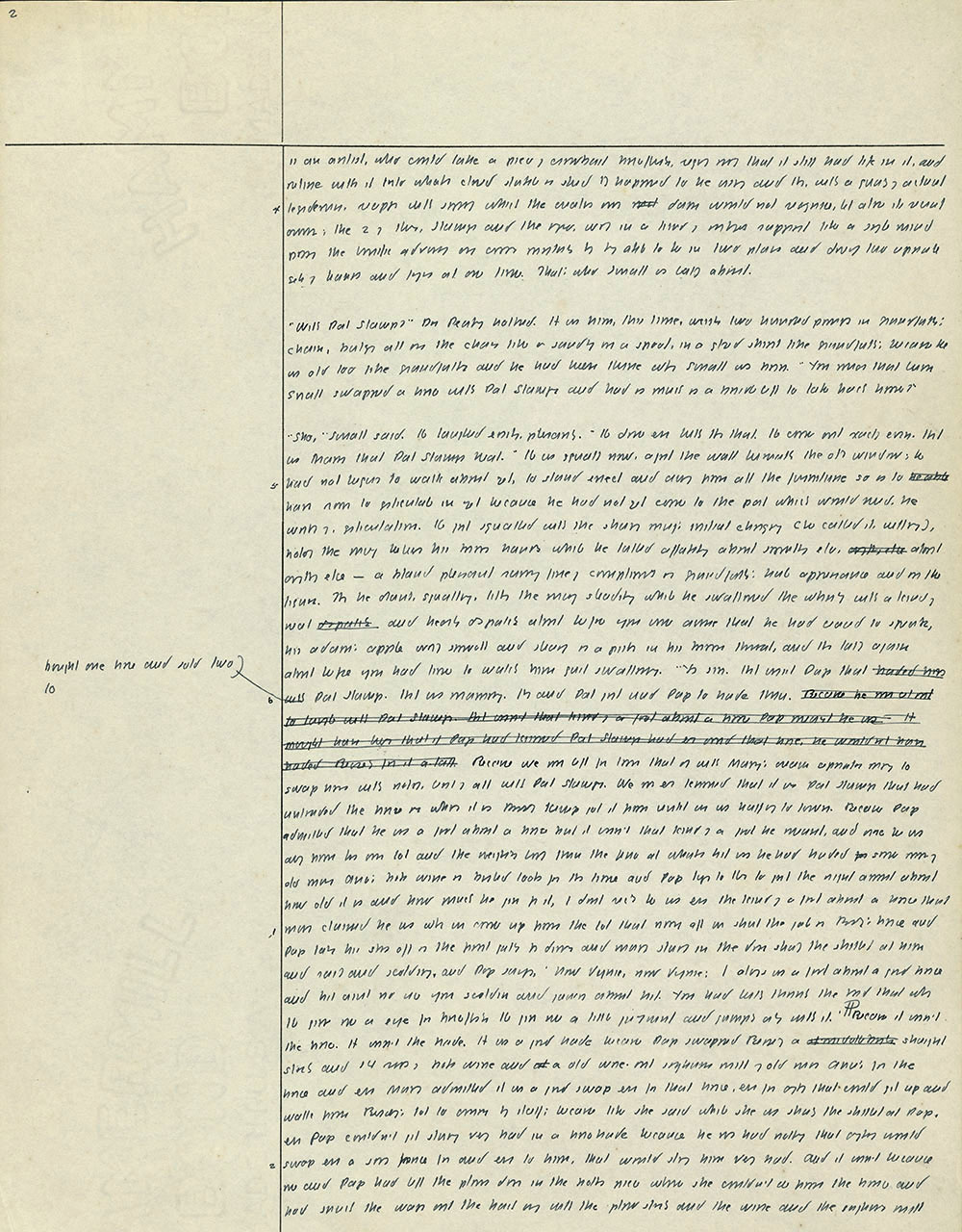TRANSCRIPTION
is an artist, who could take a piece of crowbait horseflesh, requiring only that it still had life in it, and
retire with it into whatever closed stable or shed they happened to be using and then, with a quality of actual
legerdemain, reappear with [something?] which the creatures own <mot> dam would not recognize, let alone its recent
owners; the 2 of them, Stamper and the negro, working in a kind of outrageous rapport like a single mind
possessing the terrific advantage over common mortals of being able to be in two places and [illegible] two separate
sets of hands and tongues at one time. That's who Suratt was talking about.
"With Pat Stamper?" Doc Peabody hollered. It was him, this time, weighing two hundred pounds in Grandfather's
chair, bulging all over the chair like a sandbag on a spool, in a glazed shirt like Grandfather's; because he
was old too like Grandfather and he had been there when Suratt was born. "You mean that Lum
Suratt swapped a horse with Pat Stamper and had as much as a bridle left to take back home?"
"Sho," Suratt said. He laughed easily, pleasantly. "He done even better than that. He come out exactly even. Hit
was Mammy that Pat Stamper beat." He was squatting now, against the wall beneath the other window; he
had not begun to walk about yet, to stand erect and away from all the furniture so as to <be able>
have room to gesticulate in yet because he had not yet come to the part which would need, be
worthy of, gesticulation. He just squatted with the shaving mug's initial charging (he called it, wetting),
holding the mug between his brown hands while he talked affably about something else, <anything else> almost
anything else – a bland pleasant line of compliments on Grandfather's hale appearance and on the
liquor. Then he drank, squatting, lifting the mug steadily while he swallowed the whiskey with a kind of
neat <[illegible] and hearty dispatch almost before you were aware that he had ceased to speak,
his adam's apple working smooth and steady as a piston in his brown throat, and then talking again
almost before you had time to watch him quit swallowing. "Yes sir. Hit wasn't Pap that <traded horses
with>
[margin: bought one horse and sold two to]
Pat Stamper. Hit was Mammy. Her and Pat just used Pap to trade through. <Because he was [illegible]
to trade with Pat Stamp. Hit wasn't that kind of a fool about a horse Pap meant he was. It
mought have been that if Pap had learned Pat Stamper had ever owned that horse, he wouldn't have
traded. Because for [illegible]> Because we never left for town that [illegible] with Mammy's cream separator money to
swap horses with nobody, least of all with Pat Stamper. We never learned that it was Pat Stamper that had
unloaded the horse on whoever it was Beasley Kemp got it from until we was halfway to town. Because Pap
admitted that he was a fool about a horse but it wasn't that kind of a fool he meant, and once he was
away from his own lot and the neighbors looking through the fence at whatever hit was he had traded <for> some more of
old man Anse's bob wire or busted tools for this time and Pap lying to them to just the right amount about
how old it was and how much he gave for it, I don't reckon he was even the kind of a fool about a horse that
Mammy claimed he was when we come up from the lot that noon after we shut the gate on Beasley's horse and
Pap took his shoes off on the porch [illegible] for dinner and Mammy standing in the door shaking the skillet at him
and railing and scolding, and Pap saying, 'Now Vynie, now Vynie; I always was a fool about a good horse
and hit aint no use you scolding and jawing about hit. You had better thank the Lord that when
He give me an eye for horseflesh He give me a little judgment and gumption along with it.' [Paragraph] Because it wasn't
the horse. It wasn't the trade. It was a good trade because Pap swapped Beasley a <[illegible] middle buster> straight
stock and 14 rods of bob wire and <an> a old wore-out sourghum mill of old man Anse's for the
horse and even Mammy admitted it was a good swap even for that horse, even for anything that could git up and
walk from Beasley's lot to ourn by itself; because like she said while she was shaking the skillet at Pap,
even Pap couldn't git stung very bad in a horse trade because he never had nothing that anybody would
swap even a sorry horse for and even to him, that would sting him very bad. And it wasn't because
me and Pap had left the plows down in the bottom piece where she couldn't see from the house and
had snuck the wagon out the back way with the plow [illegible] and the wire and the sourghum mill
|


